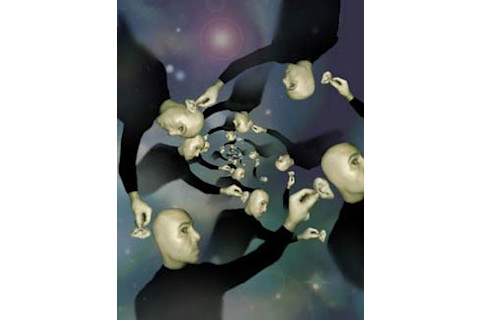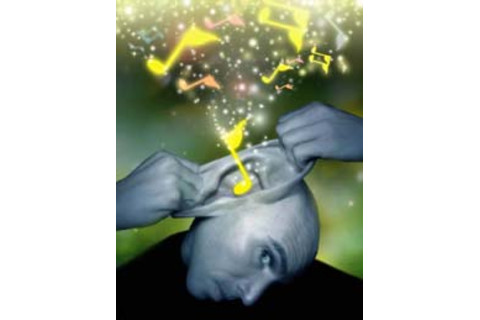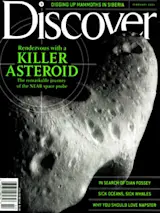I'm in the unusual position of being both a computer scientist and a professional musician. On the computer side, I'm best known for my work in virtual reality, a term I coined in the early 1980s. As a musician I write, perform, and record my own work. Canons for Wroclaw, a concerto I created for virtual instruments, was performed last December by the Chamber Orchestra of Wroclaw, Poland.

Illustration by Matt Mahurin
All of this means that I have a few deeply felt ideas about Napster, the free software millions of people use to share their music collections over the Internet. Big media companies see Napster as theft because they can't collect royalties when people use it. So they have asked the courts to kill it. As I write this, a settlement seems to be emerging. Napster will probably begin to charge for its services and pay royalties to at least some record companies.
Whatever happens, the legal decisions surrounding Napster are important for reasons that transcend the music business and extend to our basic concepts of what it means to be free in a democracy. I believe the anti-Napster forces have failed to foresee dangerous implications of their course of action. They aren't thinking about the harsh logic at the core of this technology. They do not understand what I call the Law of the Excluded Digital Middle: Digital tools can be either open or closed but resist being anything in between. An open digital tool is one that can be used in unforeseen ways. A tool like e-mail, meant to send text, might also— surprisingly— be used to send music. A closed tool is one in which there are technical restrictions that prevent unforeseen uses. Cell phones are currently closed; no 19-year-old kid can reconfigure them. The advantage of open tools is that more people can create new things with them; consequently, they tend to be more innovative. Closed tools are usually created because it is thought they will be more profitable: An owner can control them well enough to enforce bill collection. (Of course, the open software movement energetically promotes the idea that innovation ends up generating more money than control does.) At any rate, closed tools are almost always packaged as pieces of hardware— with some powerful exceptions, such as Microsoft Windows, software that is turned into a closed system by tying it to a hardware transaction— the purchase of a computer. If Windows had to be bought separately, some people would share it for free over the Internet instead of paying for it, just as if it were a song on Napster.
The alternative to allowing free file sharing à la Napster is to enforce a frightening level of control of information movement. It might not seem obvious why this would be true, so I'd like to offer a thought experiment to show you the future I fear.
First, let's suppose that the supreme Court declares Napster-like software illegal this year. Then jump ahead with me to the year 2015 for a look back at how things went:
After the court's decision, Napster was no longer available for free, but literally dozens of new, free Napster-like systems sprang up within months. At first, people hesitated to use this free software because they wanted to obey the law. Then a fresh generation of teen programmers came along and decided to give away the software anonymously. At the same time, music lovers felt that record companies were overcharging for CDs and underpaying musicians. By 2002, tens of millions of people were embracing this new software, whose use had been designed to be hard to detect.
Without a central company like Napster to sue, it became expensive to track down and prosecute individuals who shared music files. So more and more people quietly violated the law. Children, in particular, grew up as perpetual lawbreakers.
This shouldn't sound far-fetched. It is happening already.
CD sales started to increase because technology made it easier for people to discover new music that spoke to them. The Internet proved itself a better means than radio for getting people excited enough about new music to go out and spend money on it.
This shouldn't sound far-fetched. It is happening already.
But CD sales plummeted when the wireless Internet began to work really well. By 2003, every car radio, pair of headphones, and alarm clock was hooked up to the wireless Internet, and any piece of music could be coaxed out of any gadget anyone owned.
The record companies tried to guard their copyrights by putting copy protection codes on music files. But there was always someone who could figure out how to break the code. In fact, if somebody couldn't break the code, he or she could simply rerecord the song through a speaker and microphone, then play it on any music software; the next day thousands of free copies could be flying around the globe.
This shouldn't sound far-fetched. It is happening already.
In desperation, record companies worked with electronics concerns to create what's known as an end-to-end solution so that they could enforce copy protection all the way to the end of the chain of delivery, which in the case of music meant the audio speaker. By 2004, it was illegal to build speakers that could respond to old-fashioned analog inputs. Instead, manufacturers made speakers that responded to digital inputs so they could play only music authorized to be heard at a given time and place.
This shouldn't sound far-fetched. It is happening already.
(The music industry is about to unveil an attempt at a complete end-to-end plan for audio called the Secure Digital Music Initiative. The system isn't implemented in speakers but in the next-to-last stage of the chain, just before a musical signal goes out on a cable to a speaker. The makings of true end-to-end copyright protection technology have already appeared in the visual domain, riding on the coattails of the new flat screens that everyone will soon want. When equipped with encryption technology, the emerging standard for hooking up flat screens, called Digital Visual Interface, could be used to block image streams selectively.)
End-to-end strategies for protecting copyright bothered some people because, in a democracy, citizens are supposed to act as partners in enforcing laws. They argued that those forced to follow rules without being trusted even for a moment are, in fact, slaves.

Illustration by Matt Mahurin
Even after people adjusted to them, end-to-end schemes caused problems. Lots of folks still made their own recordings and wanted to send them to friends. As microphones and editing software got very good and very cheap, amateur musicians bought and used them. What the media companies decided they needed was an audio speaker that could distinguish a homemade song from a pirated dub of valuable copyrighted material. In lieu of that, they asked for, and got, legislation that forced everyone to copyright, or at least register, every work of art, even those made by amateurs at home. By 2005, every stream of sound had to present the right documentation to a pair of headphones or speakers— or the music couldn't be played. Before long people were hoarding old analog speakers. In 2006, the recording industry persuaded eBay to refuse to list them.
The same story played out visually. By 2007, computer screens had finally gotten both good and cheap. By 2008, people who wanted to e-mail a video of their baby's first birthday— to doting relatives— so they could watch the infant's antics on those excellent screens— were forced to register homemade videos before transmitting them. By 2009, monitoring visual communications became hopelessly complicated because a new generation of Net-videophones, which offered a just-like-being-there experience, spread like wildfire. (In fact, a guy named Jaron Lanier had been pushing an early, primitive form of this technology, calling it "tele-immersion," back in the year 2000, but no one remembered.)
Then the real trouble started. In 2010, rebellious college students began throwing copyright-breaking "projector parties," in which one kid would pay to see a movie in a theater while he then broadcast it live to a whole gang of revelers, in some cases thousands of them. Instead of paying for a movie, kids just searched the Net for a party showing that movie and watched it for free.
This shouldn't sound far-fetched. It is happening already with low-quality video-chat technologies.
The movie studios complained, and the courts quickly ruled against projector parties. The FBI staged some highly publicized busts. After 2012 things deteriorated to the point where people had to register not only works of art but also each video or audio conversation they had over the Internet. Unregistered material simply wouldn't play on any video screen or speaker in the land. A snooping system checked to make sure that the person whose ears and eyes were about to be stimulated had to pay for the privilege. Now you're probably wondering: Who ran the snooping system?
There were various proposals. In 2012, legislation to create a major new branch of government for performing such monitoring was proposed, but, after a bitter battle in 2013, Congress refused to fund it. For a while, thousands of mom-and-pop businesses, owned by the same people who used to run video rental shops, offered local copyright authorizing services. This proved inefficient, unreliable, and rife with opportunities for corruption.
The only way to keep digital file transfers under control was to have a handful of strong, centralized authorizing businesses, rather like the three big credit-rating agencies that emerged in the late 20th century. Soon people were paying per item of media, resulting in a truly vast number of transactions that had to be kept track of.
You might wonder why people didn't receive just one simple monthly bill. They did, in 2013. The problem was that the bill covered telephone and videophone calls, e-mail, movie viewing, even moviemaking— every activity involving the movement of information. Constant and titanic legal battles developed over who would get what portion of the enormous sums collected. Industries with divergent business models simply couldn't find common ground. Every time a case was resolved, the billing structure became more fractured and complicated. By 2015 the system had reverted to per-item billing.
Some people complained that the government had handed out a small number of multibillion-dollar gift certificates to this new breed of copyright authorizing mogul. While many agreed, there was no turning back.
The logic of the situation compelled authorizers to intervene in private as well as commercial communications. These new middlemen became arbiters of how much citizens should pay when they shared information with one another. There was no rational means of setting such prices, because the scarcity of the product was artificially created and government-imposed. Fifteen years later, we can now see that when the courts killed Napster, they unwittingly set us on a road that ended in a massive government-sponsored protection racket.
So that's my thought experiment— bleak and alarmist, perhaps, but one that follows directly from the logic of this situation. If we make Napster-like free file sharing illegal, we'll have to rid ourselves of either computers or democracy. You can't have both. And the issues raised by Napster aren't going away. They are going to rise up again and again until our society makes some difficult decisions and adjustments.
As a computer scientist, I see only too clearly that no matter how much money litigants spend in attempts to stop file sharing, the practice will go on anyway. As a citizen, I fear the threat to democracy implicit in my thought experiment, particularly because I suspect people might allow this threat to come to fruition before they understand the circumstances and long-term effects. The sane solution is not to waste all our energies fighting pointless battles in court but to seek out creative means of compensating musicians— and the technicians and businesspeople who make it possible for them to create their songs.
As a musician, I have come to believe that free file sharing is good for the soul. In the short run, we may lose money. But we are a tenacious lot, and we will figure out new ways to make money in cyberspace. If we believe in the future of music— and I don't mean remarketing rock 'n' roll to each new generation but rather encouraging unbounded creative exploration— then we should celebrate the open Internet.














